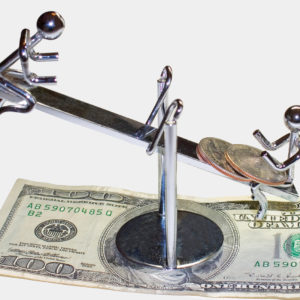S&P 500 CEOs are responsible for “America’s income inequality crisis.” At least, according to union officials.
The AFL-CIO — America’s largest federation of labor unions — recently released its annual Executive Paywatch report, which blames income inequality on business leaders who are “paying themselves more and more.” In an attempt to expose “corporate greed,” the AFL-CIO report found that the “average CEO of an S&P 500 Index company” earned $13.94 million in total compensation last year, while the “average production and non-supervisory worker” made just over $38,000. Therefore, union researchers conclude, CEO pay is “361 times that of the average worker.”
Memo to union officials: It’s not exactly groundbreaking that the CEOs of Apple and Time Warner — companies with thousands of employees — make more money than a part-time restaurant worker.
As the American Enterprise Institute’s Mark Perry explains, the report is “based on a series of flawed statistical assumptions.” For example, the AFL-CIO routinely uses the mean CEO compensation figure, which is always higher than the more sensible median figure. Moreover, “the fringe benefits that all rank-and-file workers, even part-time workers, receive as part of their total compensation are mysteriously not considered by the AFL-CIO.”
Perry poses the question: “How would the AFL-CIO’s CEO-to-worker pay ratio change if we calculate average pay for full-time workers?” It’s certainly a fair question, and one that union officials didn’t even bother to address.
The AFL-CIO’s statistical manipulation doesn’t end there. When you include the chief executives at America’s 30 million small businesses — from neighborhood grocery stores to mom-and-pop diners — the pay gap drops considerably. According to Bureau of Labor Statistics data, the average U.S. “chief executive,” including small business owners, earned $196,050 in gross salary last year — nowhere near the AFL-CIO’s $13.94 million figure.
Shocker: The owner of a local restaurant typically doesn’t make 361 times more money than a hostess or wait staff.
It’s no wonder that PolitiFact’s John Kruzel described Big Labor’s CEO-worker pay gap as the “high side of research,” noting that even the union-funded Economic Policy Institute’s calculation was lower. The editorial board at Investor’s Business Daily put it more bluntly: “It’s a textbook case of an apples-to-oranges comparison.”
If anything, the AFL-CIO’s flawed research changes the subject — from Big Labor’s own “income inequality crisis.” A review of union financial disclosures filed with the Labor Department found that dozens of union presidents make more than the average CEO. In fact, 146 union presidents earn a higher gross salary than the average CEO ($196,050). Three make more than $500,000 in base salary alone.
And union officials can also expect much more than a salary, including paid-for travel expenses and other business disbursements. In 2017, 193 union presidents earned more than $196,050 in total compensation. Timothy Canoll, president of the Air Line Pilots Association, made nearly $793,000. Roger Robinson, president of the United Food and Commercial Workers Local 876, raked in more than $663,000. AFL-CIO President Richard Trumka, whose labor group put out the Executive Paywatch report, earned more than $315,000 last year — far more than a typical CEO.
Rather than throwing stones from glass houses, Trumka and other union officials would be better served actually representing their members — and finding new ones. Last year, the vaunted AFL-CIO laid off “dozens of staff members as part of a restructuring amid continuing declines in union membership.” The Service Employees International Union announced a 30 percent budget reduction, citing a need to “dramatically rethink” the union’s strategy moving forward.
A new strategy is long overdue. In 2017, fewer than 7 percent of private-sector employees were union members — down from one-third of all workers in the 1950s. According to Rasmussen polling, nearly 60 percent of current and former union workers consider union officials “out of touch” with their members.
Given fiascos like “Executive Paywatch,” can you blame them?

